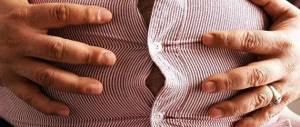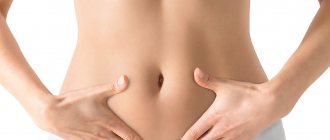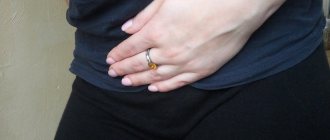Parasites are a common cause of flatulence and bloating. THESE “KILLERS” WILL BE LOMIC IF...
Special changes that regularly occur in the female body some time before the start of the cycle indicate the onset of ovulation. One of the symptoms may be bloating. What is the reason for this phenomenon and how to get rid of it? Let's figure it out.
How many days before your period does your belly get bigger?
The abdomen begins to increase in size before menstruation in women individually: starting from 1.5-2 weeks to 2-3 days. It depends on the presence of factors:
- Body type. A person is thin, overweight or of normal build.
- Physical training. Pumped up abdominals or weak ones.
- Elasticity of the uterine muscles. Usually weakens after childbirth. Special gymnastics is required to bring the pelvic floor muscles back to normal.
In young athletic girls, the belly does not increase before and during menstruation, but in obese and women who have given birth, bloating is observed, and a weight gain of 2-3 kg is possible. This is a natural reaction of the body, do not be afraid. On the 2-3 day of bloody discharge, waist size and weight return to normal.
Causes of bloating before menstruation
To combat unpleasant symptoms of PMS, you need to know the reasons for their occurrence. They are divided into a number of categories.
Hormonal reasons
The menstrual cycle of women is a complex process, accompanied by monthly hormonal changes in the body during the childbearing period. The changes are associated with the level of three hormones: prolactin, progesterone, estrogen. The level of estrogen increases at the time of ovulation, gradually decreasing, with progesterone the opposite: the maximum amount occurs at the beginning of bleeding. Premenstrual syndrome causes a decrease in estrogen levels while increasing progesterone.
- Endometrial growth. The female hormone responsible for preparing the body for conception and bearing a child is called progesterone. It stimulates the growth of the endometrium (the mucous membrane inside the uterus), which has a porous structure consisting of many blood vessels. The substances necessary for development are supplied to the embryo through the vessels. This is how the body prepares for conception. The uterus swells, affecting the intestines, and the size of the abdominal muscles increases. If pregnancy does not occur, the reverse process begins. The membrane peels off, leaves the body with blood during menstruation, compression of neighboring organs goes away, and the size of the uterus returns to normal.
- Swelling. These same hormones force the female body to accumulate excess water in the abdominal tissues, arms, legs, and face. During blood loss, this helps to avoid dehydration and, when processed, the fluid enters the blood.
- Ovulation. Often the belly begins to swell during ovulation. A strong hormonal surge occurs, to which the body reacts with pain, bloating, and flatulence.
Intestinal peristalsis
In the period after ovulation before spotting, blood flow to the uterus and ovaries increases. They begin to swell, squeezing the intestinal walls, causing spasms. Food moves unevenly, forming air barriers. The woman's stomach growls, swells, severe gas formation begins, and stool upset. After menstruation everything returns to normal.
Pregnancy
Perhaps pregnancy has occurred. In the first weeks it is difficult to determine. Due to the hormone progesterone, a change occurs in the body that prepares the female organs for bearing and giving birth to a child. The stomach inflates, the chest swells, and body weight increases. It is possible to independently determine pregnancy in the early stages by a hard lump in the lower abdomen. If conception does not take place, the belly remains loose and soft. A delay of a couple of weeks indicates the need to purchase a pregnancy test at the pharmacy. If the result is positive, you should contact a gynecologist.
Pathological processes
A slight swelling in the waist area does not interfere with everyday life, but if the stomach is very swollen before menstruation, constantly rumbles, and hurts, this indicates hidden human illnesses:
- Gastrointestinal diseases. Colitis and gastroduodenitis are often chronic, sometimes manifesting as acute attacks of pain. Blood and water, having accumulated in the abdominal cavity, put pressure on the internal organs, provoking an exacerbation of diseases. Gases swell the intestines, causing cramps, nausea, flatulence, and problems with bowel movements. Severe pain is likely in the lower abdominal cavity, in the navel area.
- Genitourinary system. With kidney disease, fluid is constantly retained in the body, and when menstruation occurs, the frequency of urination decreases significantly. An enlarged abdomen is accompanied by: swelling of the legs, arms, and face. Bags appear under the eyes, constant dull pain in the lower back. There is drowsiness, lethargy, and rapid heartbeat. Blood pressure rises.
- Gynecological diseases. The symptom “acute abdomen” is considered a sign of female diseases, which are characterized by severe pain and spasms radiating to the anus and lower back:
- inflammation of the ovaries, uterus;
- adhesions in the pelvic organs;
- chronic oophoritis;
- ovarian cyst;
- neoplasm: uterine fibroids. This benign tumor can develop into malignant. The presence of fibroids is characterized by a rounded tummy, as during pregnancy, then severe pain appears, and menstruation may stop. If you have fibroids, you should be under constant supervision of a gynecologist and undergo an examination once a year.
Binge eating
Thanks to the hormone progesterone, which acts on the nervous system, almost all women begin to feel hungry a week before their period. They eat a lot, become nervous and irritable.
To cheer up, you want to experience joy, have fun. The easiest way to get rid of depression is to eat delicious food. And everything tasty, as a rule, high-calorie or salty, leads to fluid retention and the appearance of a round belly.
PMS and the associated hormonal imbalance negatively affect a woman's will. If usually many limit themselves in food and refuse sweets, then here women give in.
Large volumes of food at this time are poorly digested, food masses stagnate in the intestines. The result is flatulence and bloating.
What to do if you have bloating?
What to do to overcome this unpleasant phenomenon? You can’t get rid of it completely, but you can reduce the size and period of bloating. To do this, you need to follow a healthy lifestyle and doctors' recommendations.
Playing sports
Constantly engage in available sports: water aerobics, swimming, dancing, exercise equipment, running. During menstruation, heavy exertion is not recommended; it is better to walk long distances. While walking, gases are removed from the intestines and gastrointestinal tract much faster. Lie down only if you feel unwell. Pump up your abs, do exercises to strengthen your back muscles.
Proper nutrition
Proper nutrition is one of the main ways to combat bloating. Before menstruation, it is advisable to reduce food portions and increase the number of meals. Limit or completely avoid junk food and products that cause flatulence.
- Eat less salt. During PMS, as during pregnancy, you crave salty foods. Sodium retains water in the body, increases the load on the heart and hematopoietic system, and increases swelling.
- Limit your sugar intake. All sweets in the body are processed into glucose, which retains sodium in the body.
- Drink water. It improves digestion, helps fight constipation, and removes toxins from the body.
- Avoid tea, coffee, alcohol and carbonated drinks. They contribute to bloating.
- Drink herbal teas from mint and decoctions of chamomile, lingonberries, and cranberries. They reduce pain and remove excess fluid from the body.
- Eat foods rich in fiber. They help fight constipation.
- Keep it in moderation. When consuming large amounts, gas formation and bloating begin. A lot of fiber is found in cabbage, bran, beans, beans, and mushrooms.
- Temporarily exclude dairy products from your diet, which increase the manifestations of flatulence many times over.
- Take a complex preparation containing B vitamins, potassium, magnesium. They are responsible for digestion, strengthening blood vessels and calming the nerves.
Warm baths
Before your period starts, take warm, soothing baths. You can add sea salt, a few drops of fennel or black pepper essential oil, and a decoction of valerian, pine needles, mint, and sage herbs to the water. Baths help you relax, promote healthy sleep, and strengthen the nervous system.
Sex is good for the body. To improve your well-being and mood, doctors recommend having sex before your period. It helps blood circulation in the pelvic area and has a beneficial effect on the female body.
If your belly enlarges for natural reasons, you should not try to tighten it with a corset or shapewear. Strong compression causes severe pain due to impaired blood supply, increased swelling, intestinal spasms, and flatulence. It is better not to tighten your stomach, but to wear loose clothes.
If the abdominal volume increases, take medications depending on the cause of the bloating:
- If the main symptom is tension, pain, spasms of the intestines and uterus, then antispasmodics help well: 1-2 tablets of No-shpa, Spasmalgon, Drotaverine.
- If your stomach is very swollen, use carminatives: Disflatil, Espumisan, Antareit.
- If you experience flatulence, bowel dysfunction, nausea, use enterosorbents: Smecta, Polyphepan, Activated carbon.
The medication should not be abused. It is better to consult a gynecologist.
Bloating occurs in 75% of women. This is a normal reaction of the body to hormonal changes during premenstrual syndrome and menstruation. If the symptoms of PMS do not go away, contact a specialist and conduct a comprehensive examination. After treatment of concomitant diseases, if preventive rules are followed, a slight increase in the waist will be noticeable only a couple of days at the beginning of menstruation.
Not everyone has information about ovulation and has no idea what causes it. The phenomenon that causes a maturing follicle to burst, followed by the release of an egg into the fallopian tube, is called ovulatory syndrome. Two weeks after ovulation, the menstrual cycle begins. The process is accompanied by painful sensations and an unpleasant feeling in the stomach or genitals.
Regardless of the torment, ovulatory syndrome is a favorable moment for conceiving a child. Within a day, the egg is ready for fertilization, and women conceive a child. Others, on the contrary, abstain from sex to avoid pregnancy. Knowing when ovulation begins helps you determine when your pain will start and help you prepare.
During ovulation, the stomach hurts due to the stretching of the follicles, which burst, releasing the egg into the uterus. The sensations are heavy, not only the stomach hurts, the whole body suffers. True, for most women the process is painless and quick. There are many causes of suffering; in case of prolonged discomfort, consult a doctor for advice.
The impressions of passing through the middle of the menstrual cycle are different, ranging from neutral to painful symptoms. The main role is played by the woman's health status. A sick body endures challenges worse than a healthy one. The passage of the ovulatory period serves as an indicator of health status.
Help
What can you do if flatulence occurs? If pregnancy is not confirmed, but pain and bloating are present, swelling of the soft tissues in the lower abdomen additionally appears - this is a signal that you need to see a doctor and get advice.
The diet should be reconsidered. Sometimes poor nutrition does more harm than any disease. A change in the menu, following a diet, and gentle dietary food will allow the gastrointestinal tract to recover and function normally again. Foods that cause increased gas formation should be excluded. Remove sour, fatty, spicy, smoked, alcohol, smoking. Carbonated drinks are among the provocateurs of flatulence.
If you drink chamomile infusion instead of soda, intestinal motility will significantly improve. The product will help remove toxins from the body, having a diuretic effect.
Vitamin B, magnesium, potassium are only welcomed by the body. Deficiency mania has an extremely negative impact on the condition of the intestines. At this moment, salts and water are retained in the body. The stomach is swollen and hurts. A significant deficiency of magnesium in the blood creates stress. It is possible to replenish magnesium reserves with dark chocolate (at least 70% cocoa beans) or by taking a mineral complex with a high magnesium content.
The pain syndrome that occurs during ovulation is provoked by estrogen and prostaglandin. It is enough to exclude alcoholic drinks, caffeine, milk from the menu, hold out for 1 month and monitor your well-being. Taking Omega-3 will reduce the amount of prostaglandin in the body and significantly reduce pain.
What not to eat during periods of pain and bloating:
- Any food products related to legumes. This food is considered heavy, takes a long time to digest and remains in the digestive tract.
- Give up sweets and starchy foods for a while.
- Avoid pickled foods, pickles, and smoked foods on the menu.
- Soda provokes an increase in the amount of gases in the intestines, which further provokes flatulence.
- Potato dishes, fresh cabbage.
- Yeast bread and any product created using yeast.
Try to consume fermented milk, low-fat foods. During any period of the menstrual cycle, physical activity is necessary. You will need to monitor the moderation of loads and avoid severe fatigue.
During this period, it is recommended to engage in calm sports: yoga, stretching. You can swim in the pool, this puts stress on all parts of the body, while relaxing it at the same time. It is advisable to postpone cardio training to a more suitable period. As maintenance medications, it is recommended to take multivitamin complexes with an increased content of B vitamins.
If you follow the recommendation, you can avoid the occurrence of unpleasant sensations or significantly reduce the intensity of the symptoms. Sharp, nagging pains are removed. It is possible that the pain syndrome indicates emerging pathologies of the internal organs of the pelvis.
It is advisable to visit a gynecologist for consultation and diagnostics. After receiving the results, if necessary, treatment is prescribed.
The onset of ovulation is easy to determine by the presence of sensations and symptoms that accompany it. These include an increase in basal temperature, cramps in the lower abdomen, as well as bloating and accompanying flatulence. It is the latter phenomenon that is often confused with emerging problems in the gastrointestinal tract, but this is not entirely true. The article will look into why this phenomenon occurs during and after ovulation.
Ovulation abnormalities
Some women experience discomfort during ovulation, although it all depends on the characteristics of the body. At the end of the first half of the menstrual cycle, sometimes the ovary hurts and the lower abdomen pulls. The pain can be so severe that it creates a pre-fainting state. Unpleasant sensations last in different ways, the period is measured in moments and ends in days. After ovulation, menstruation occurs after 14-15 days. Deviations from deadlines are rare and are caused by a combination of reasons.
Malnutrition, diet, affects the menstrual cycle, inhibiting the production of necessary hormones. Proper nutrition is the key to good health. You need to carefully monitor the balanced content of fats and fiber. A negative factor is excessive alcohol consumption, which causes hormonal fluctuations, leading to early ovulation.
Hormonal imbalance is caused by various factors. Among them are stressful situations, diseases, physical overload, harsh sexual intercourse, factors that cause changes in the body's chemistry, leading to an imbalance of hormones. It’s normal to try to protect the female body from negative influences.
After childbirth, the menstrual cycle is disrupted and ovulation may not occur. It will take at least six months, maximum two years, before the cycle is restored. Don't worry about missing your period after giving birth, it's part of the natural process. During childbirth, you should be attentive to the health of your body, and if you have suspicious symptoms, consult a doctor.
Characteristics and signs of ovulation
There are different types of pain: weak or strong, sharp and dull, quickly passing or lasting. The painful sensations increase with physical overload, movement and sex. The lower back, groin area and sacrum suffer. This is accompanied by bleeding. Rarely, nausea, vomiting and fainting occur.
Not every woman feels pain; for most, the process is painless or accompanied by a minimum of discomfort. For others, only part of the ovulation period is painful. These sensations continue for hours, depending on the woman's health. You should not delay visiting a doctor if you have severe, excruciating pain.
Pain in the abdominal area does not always mean the beginning of the release of an egg; other signs are noted that indicate the beginning of the process. This includes the appearance of blood discharge associated with burst vessels in the lower part of the follicle. The level of cervical mucus is increasing. An additional clue is an increase in sexual desire.
A set of reasons helps to accurately determine a woman’s readiness for childbirth. Accordingly, during this period it is worth conceiving a child or, conversely, refraining from contact. For women who do not know how to determine the right day, special tests have been developed that are purchased at the pharmacy.
Causes of pain during ovulation
Before the release of the egg, the walls of the mature follicle are stretched to their maximum, which can cause suffering. Painful sensations may indicate rupture of blood vessels. The fluid formed after the rupture enters the uterine epithelium and the abdominal wall, causing irritation, which turns into contraction of the uterus and the appearance of pain of varying degrees. Blood in the discharge is a consequence of a decrease in estradiol levels or endometrial detachment. If bleeding recurs regularly or bleeding occurs, you should immediately consult a doctor.
The painful passage of ovulation becomes a consequence of gynecological diseases, inflammation of the genital organs. These include cystitis, mastopathy, ectopic pregnancy, varicose veins in the pelvic area, as well as cancer (ovarian and cervical cancer). You should not consider the pain natural; it is better to find out what the doctor says.
Fever, aching or cutting pain in the right side may be symptoms of appendicitis. If all the described symptoms are present, consult your doctor. Also, torment is sometimes caused by excessive pain sensitivity in the pelvis.
What is the danger of pain during ovulation?
If ovulation is a natural process, why does pain occur? This incomprehensible natural phenomenon accompanies the physiology of a woman. What happens is associated with the participation of special cytosine enzymes that cause inflammation, as well as spasms of blood vessels. The peculiarity of these phenomena explains the phenomenon: some women do not feel pain, but a select few lose consciousness.
To know exactly what danger pain in the middle of the cycle poses, you need to undergo an examination at the clinic. An experienced doctor will use an ultrasound to determine the presence of causes of discomfort: pelvic inflammatory tumors, adhesive disease of the pelvic organs, functional ovarian cysts, tumors, underdevelopment of the genital organs, and more.
Based on the results obtained, the doctor will prescribe microbiological and hormonal tests. After all procedures, a diagnosis is established. If there are no diseases, there is only one cause of pain - ovulatory syndrome. Further actions depend on the level of pain. If it is tolerable, it is permissible to refuse further treatment. When pain interferes with normal life, a doctor is consulted.
Reducing pain symptoms of ovulatory syndrome
If, after an examination at the clinic, it becomes clear that the pain is caused by ovulation and not by a disease, you can already decide what to do with it. The most common way is to use painkillers and antispasmodics. They do an excellent job of relieving pain. Birth control pills also help suppress the symptoms of ovulation, but before use you should carefully consult with your doctor, they sometimes harm the body.
It is advisable to take a day off during the crisis and rest at home. During this period, you should reduce physical activity and stressful situations. It is worth moving less, moving around less and sleeping more. In communication, you should avoid scandals and nervous shocks, which will negatively affect your well-being.
An additional way to reduce pain will be a special diet. During this period, you should avoid fried, salty, spicy, sweet and fatty foods. It is not recommended to consume legumes, chocolate and coffee. The listed products negatively affect the nervous system. Bloating and flatulence also lead to abdominal pain.
During the day, it is recommended to drink more plain, clean water. It is better to use before ovulation and continue after. A heating pad is filled with water and applied to the lower abdomen. This will help relieve pain.
Sign of pregnancy
If after ovulation the egg attached to the walls of the uterus is fertilized, pregnancy occurs. It is during this period that the body begins to prepare for bearing a fetus, against which the first changes occur. They are provoked by the hormone progesterone, which weakens the muscles of the uterus, enlarging it, and at the same time acting on the intestinal walls. A relaxed intestine begins to digest food more slowly and less often pushes digestive products out of the body, so a process of increased fermentation occurs, accompanied by colic, an increase in the size of the abdomen, increased gas formation and constipation. Bloating is inevitable during pregnancy, since changes in the condition of the uterus will in any case affect digestion.
Medical assistance
A gynecological examination is necessary once every six months, even if everything is fine with your health. It's time to go to the doctor when pain in the middle of the menstrual cycle does not go away for two days. You should pay more attention to warning signs; the symptoms of the disease vary:
- The pain is so severe that it leads to loss of consciousness (go to the doctor immediately, and do not wait until it passes).
- Increased body temperature, pain and dizziness, constant nausea and vomiting, painful urination, shortness of breath and diarrhea (possibly with blood).
It is worth paying more attention to the signs that turn out to be ovulatory syndrome or the first signs of the disease. After thirty years, it is worth increasing attention to the health of the body. Diseases begin to manifest themselves as an unpleasant sensation; the sooner treatment is started, the faster the recovery will be. You should know all the symptoms that affect pregnancy.
Today, a woman, even without special tests or visiting a doctor, can determine the right day for possible conception, focusing on changes in her body. These changes include bloating on the day of ovulation.
The main physiological signs of ovulation
Ovulation is a short period of the female cycle that occurs between the follicular and luteal phases. Characterized by the release of a mature egg from the ovary. A woman can identify this process physically by listening to changes in the body. The cell continues to move along the fallopian tube towards the sperm.
Main symptoms of ovulation. How to determine the day of ovulation
Each woman feels the ovulation period somewhat specifically, but there are a number of common signs:
- change in the structure of discharge (abundant, viscous);
- increased sexual desire (in about 48 hours);
- jump in basal temperature;
- changes in the cervix;
- pain in the lower abdomen;
- some bloating during ovulation;
- breast enlargement and tenderness; increased levels of hormones in the blood and urine.
Is this possible and if so, how often?
Bloating and increased gas production during the period of ovulation can be considered as one of the signs of rupture of the follicle with a mature egg and its release into the fallopian tube.
This physiological reaction is directly related to a sharp change in the concentration of progesterone in the blood in the middle of the monthly cycle. The sex hormone suppresses the contractile activity of the smooth muscles of the uterus, which serves to prevent miscarriage during pregnancy.
It’s not for nothing that the ovulation process is called “mini-pregnancy” - progesterone during this period has the same effect. It affects not only the smooth muscles of the uterus, but also all other smooth muscles of the abdominal cavity, including the intestines. A relaxed intestine slows down peristalsis, preventing the timely removal of gases, causing bloating and constipation.
Gynecologists are of the opinion that if the belly is swollen during the process of releasing the egg from the ovary and for several days after that, then this is normal and there should be no cause for concern. According to experts, the vast majority of patients do not notice signs of bloating during ovulation and do not experience discomfort during these days.
Important! Follicle rupture is felt most acutely by women with a history of pregnancy or childbirth.
What does bloating mean?
Many women notice slight swelling in the lower abdominal cavity during ovulation. This condition is often associated with the reproduction process, but can also be a consequence of an error in diet. There are three main conditions: bloating before, during and after ovulation.
Bloating after ovulation
So, bloating after ovulation is observed along with minor aching, nagging pain. This is a normal state at the moment. The pain is caused by rupture of the ovarian membrane when the germ cell is released.
Bloating during ovulation
Often, bloating during ovulation is accompanied by increased gas production. This phenomenon also acts as a peculiar reaction of the body to the process of the cell exiting and moving towards the uterus.
Bloating before ovulation
But bloating before ovulation is not a typical phenomenon and rather indicates a violation of nutrition (diet), or eating a large amount of carbohydrates. It is better to reconsider your diet so as not to feel discomfort.
So, there are enough signs characterizing the day of ovulation. By focusing on them and observing her body, a woman without outside help can control and determine the time for the start of pregnancy.
Special changes that regularly occur in the female body some time before the start of the cycle indicate the onset of ovulation. One of the symptoms may be bloating. What is the reason for this phenomenon and how to get rid of it? Let's figure it out.
Causes of the phenomenon
Abdominal bloating during ovulation can hardly be called a sign that, to one degree or another, indicates the presence of ovulation itself, and therefore it is definitely not worth determining the period favorable for conception by bloating, as some women advise on thematic forums on the Internet. If the stomach is swollen, this does not mean that the woman has ovulated at all or will happen in the coming days.
Ovulation is a cellular, microscopic process; the size of the germ cell that emerges from the follicle is very small, and therefore it is definitely not worth talking about increased gas formation for this reason. But the entire process of ovulation is invariably and without fail regulated by hormones, which theoretically can also influence the process of accumulation of gases in the intestines.
During the first half of the menstrual cycle, follicles located on the surface of the ovaries mature under the influence of follicle-stimulating hormone (FSH). At first there are several of them, but then one dominant one remains (in rare cases - two), and the development of the others is slowed down and postponed until better times (the woman’s ovarian reserve is not replenished, it is limited).
1-2 days before ovulation, the level of estrogen in a woman’s body rises sharply, which gives a “push” to the rise in the level of luteinizing hormone (known as LH). Under the influence of the LH peak, the follicle membranes become thinner and burst, releasing the egg. This is ovulation. After the release of the egg, the level of progesterone begins to increase sharply, which is produced by the corpus luteum formed at the site of the ruptured follicle.
Now that we better understand the essence of the process, let's talk about the possible causes of bloating.
- Hormonal changes are what make ovulation possible, but any hormones, especially sex hormones, often cause disruption of the digestive tract - the smooth muscles of the intestine relax, flatulence is increased, and the removal of gases, on the contrary, is difficult. Typically, the main cause is a decrease in estrogen that occurs immediately at the time of ovulation.
- The action of progesterone - this hormone, which comes into its own immediately after the release of the oocyte, needs to be said separately. It purposefully relaxes the smooth muscles of the uterus to make it easier for the fertilized egg to attach to the cavity of the reproductive female organ. But the receptors of other organs that have smooth muscles are also sensitive to this hormone. For this reason, during the ovulation period, some women experience gas formation and bloating (the intestines are relaxed), as well as nausea and headaches (due to relaxation of the esophagus and stomach, as well as spasm of cerebral vessels).
- Consequences of the process of follicle rupture - inside the follicle there is a certain amount of fluid, which is a nutrient medium for the maturing oocyte. The follicle also has its own network of blood vessels that feed it. When the membrane of the vesicle ruptures, this fluid and a small part of the blood from the injured small vessels are poured into the abdominal cavity. This causes local irritation and inflammation of the peritoneum, which can also be perceived by a woman as bloating, while intestinal gases as such do not accumulate in the intestines; it turns out that the sensation is very subjective and even false.
- Dietary errors - eating large amounts of cabbage, legumes, yeast baked goods, kvass, grapes, fermented milk products and expired products can be an independent cause of bloating that is not directly related to the day of ovulation. It’s just that the bloating in this case may coincide with the middle of the menstrual cycle, which will be perceived by the woman as a relationship.
Can my lower abdomen hurt and become bloated during ovulation?
Ovulation is a short-term period of a woman's cycle, located midway between the stage of follicle maturation and the luteal phase. At ovulation, a cell ready for fertilization leaves the ovary and begins to move along the fallopian tube. At this time, the woman’s well-being changes significantly. Many people experience the following symptoms:
- The nature of vaginal discharge changes;
- Increased libido (about two days before ovulation);
- Raising basal temperature;
- Painful spasms in the lower abdominal region, closer to the pubis;
- Bloating;
- Breast thickening and enlargement, increased sensitivity of the breast nipples;
- Changes in bowel movements – diarrhea or constipation.
Many women are interested in why bloating occurs so intensely during ovulation? This is often a consequence of oogenesis, but it can also be a consequence of poor diet. This symptom is not typical for the period before the onset of ovulation and indicates that the woman’s diet has too many carbohydrates. But this is precisely a characteristic sign of the onset of ovulation, which is characterized by an increase in appetite and a desire to eat something sweet.
If bloating appears during the release of a mature egg from the ovary, it may also be accompanied by abundant gases accumulated in the intestines. This is how the body reacts to the movement of the egg through the woman’s reproductive system.
Where do gases come from?
Gas formation is a natural process in the digestive system, caused by bacteria on the intestinal walls that help digest food. Gases can not only form in the intestines themselves, but also get there with food. Some of the accumulated gases leave the body through the anus or with belching, while some remain in bubbles attached to the intestinal walls.
The formation of gases is a normal phenomenon, but sometimes their quantity goes beyond the normal limits, which provokes the occurrence of flatulence. Bloating is one of the symptoms that indicates the presence of abnormalities in the gastrointestinal tract, caused either by exacerbation of chronic diseases or dietary disturbances.
Bloating after ovulation: causes
A bloated belly and pain after ovulation are the norm for the female body. Do not worry if, against the background of past ovulation, aching or nagging pain symptoms appear in the lower abdomen. This is a consequence of the rupture of the follicle membrane when the egg is released.
Other causes of bloating after ovulation:
- Changes in hormonal levels;
- Digestive imbalance;
- Fluid retention in the body;
- PMS;
- Diseases of the reproductive system.
Hormonal changes are usually explained by some enlargement of the uterus against the background of an increase in the endometrial layer. This is more common in women who do not have strong, developed abdominal muscles, so they feel more distension and bloating in the abdominal area. At the described moment, the uterus and adnexal organs are supplied with additional blood flow, which also affects nearby organs. This leads to a malfunction in the digestive system and stagnation in the intestines.
Causes
Ovulation is a natural physiological process in a woman’s body when an egg, ready for fertilization, moves through the fallopian tubes to attach to the wall of the uterus. Bloating is one of the symptoms that inevitably accompanies ovulation. Why does it arise?
It is caused, first of all, by changes in the functioning of the hormonal system of the female body. The hormone progesterone, which actively enters the blood during egg maturation, affects the functioning of the circulatory system and all internal organs. It is progesterone that weakens the muscles of the uterus, preparing the body for a possible pregnancy. Since all the internal organs of the abdominal cavity coexist in symbiosis, the intestinal muscles relax along with the uterus, which leads to the accumulation of gases and the occurrence of flatulence.
During and after ovulation, blood flow to the uterus and, accordingly, the intestines is increased, which is why disturbances in its functioning occur.
The process of release of the egg from the follicle also affects the occurrence of bloating. At this time, the walls of the uterus thicken, putting pressure on the intestinal wall, so the woman’s stomach visually increases, and disturbances in the functioning of the digestive system occur.
During ovulation, in preparation for pregnancy, fluid retention occurs in the body, which causes swelling in both the fingers and toes, and in the abdomen.
The inflammatory process that accompanies follicle rupture is caused precisely by progesterone, which continues to be released after ovulation. Therefore, even after the egg attaches to the walls of the uterus, bloating may occur.
Attention! If bloating occurs before ovulation, it is recommended to consult a doctor. This often happens when the diet is violated or diseases of the genital organs and gastrointestinal tract develop.
What to do?
To regulate and normalize the functioning of the gastrointestinal tract during ovulation and subsequent menstruation, you need to take vitamin and mineral complexes based on magnesium, potassium and vitamin B.
For moderate pain, a woman can take antispasmodic drugs:
In case of severe pain, it is possible to take non-steroidal anti-inflammatory medications that eliminate pain and inflammation:
If pain during menstruation is regular and impairs a woman’s quality of life, she may be advised to take oral contraceptives. These drugs block ovulation, which eliminates pain. Before taking contraceptives, you should consult a gynecologist.
You can cope with bloating and abdominal pain during ovulation by following a special diet. The following products are temporarily removed from it:
- Legumes;
- Cabbage (cauliflower, white cabbage, Brussels sprouts);
- Black bread;
- Soda;
- Confectionery;
- Pickles and marinades;
- Spicy and smoked products;
- Alcohol.
Moderate physical activity (Pilates, stretching exercises) is also recommended, which relieves hypertonicity of smooth muscles and general stress.
Folk recipes
Bloating, as a sign of ovulation, can be eliminated using traditional medicine . One of the popular methods is to brew a decoction of chamomile inflorescences, which has a whole range of actions, including a laxative, sedative and diuretic. Thanks to chamomile, excess fluid accumulated in the body is eliminated faster, thereby easing the woman’s condition. You can read more about how to prepare chamomile infusion here . A decoction of dill seeds also works well for bloating during ovulation.
Herbal infusions have a positive effect . Lingonberry and cranberry tea have a powerful diuretic effect and relieve swelling and inflammation. Peppermint will reduce painful spasms by promoting the removal of fluid from the body. You can also drink decoctions of horsetail, ginger, nettle and fennel.
How to avoid?
In order not to encounter one of its most unpleasant symptoms during ovulation - bloating and increased gas formation, it is recommended to use the following preventive measures:
- taking vitamins containing magnesium citrate;
- making adjustments to the diet: excluding legumes, rye bread, carbonated drinks, alcohol;
- increased physical activity before ovulation;
- taking decoctions based on medicinal herbs: lemon balm, calendula, chamomile.
Help: Vitamin teas (cranberry, lingonberry) and infusions of medicinal herbs help not only get rid of bloating during ovulation, but also alleviate other symptoms, and also tone the body and prevent diseases of the internal organs.
During ovulation, antispasmodic and anti-inflammatory drugs can be taken to reduce pain.









